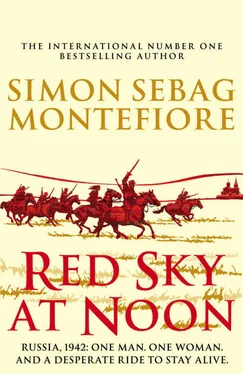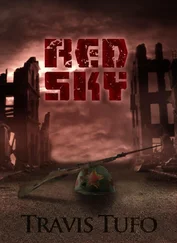Fabiana nodded and looked up into Montefalcone’s swarthy, oval face and the loose chins that wobbled as he wiped the sweat with a crested handkerchief.
‘Oh, look who’s here.’ A skinny mongrel, not unlike a starved fox, trotted in confidently and poked Montefalcone with its nose. ‘We’ve adopted this one,’ he said as he stroked it lovingly with his soft hands. ‘Jacopo, bring Anastasia some milk,’ he called to his batman. What a kind man he was. For a moment, Fabiana longed to be treated like the fox-red dog. Her mother had dreamed of her marrying such a man, an aristocratic connoisseur with puppy’s eyes. How different he was from her husband Ippolito – not to speak of Colonel Malamore.
Now she was on the Don steppe where the dust itself was thick with blood, not just of soldiers but of women and children. And her husband was dead. And Malamore visited each time he rode through, several times in the last couple of days. His intentions were clear, she thought, and shivered.
‘Don’t you want to go home?’ Montefalcone asked her.
‘ Si, signore. But first I must bury my husband.’
‘Of course, of course. We will find him. Then you must go home. I can arrange it for you. Let me, my dear, let me. This is no place for a girl like you…’
Fabiana wondered what sort of woman he took her for. What did they all take her for? She guessed they all presumed there was some shady story, perhaps a father who was a Milanese industrialist, or a mother who was the mistress of some war profiteer. She did not realize that in her mid-thirties she had become beautiful, because in her teens she had been plain and awkward. Girls who are plain in their teens never believe they can be anything else. And there was no glamorous mystery: her father was the custodian of the Venetian State Archive just round the corner from their home, a fourth-floor apartment in Campo San Stin.
She sees herself running to the nearby Campo dei Frari to that shop with the big oil-painted signs of salami and cheese, or walking with her mother to the Rialto market. She has flashes of colours and crowds and the smell of incense while crossing the votive bridges of boats with her family during the Festa del Redentore and every Sunday her mother takes her to San Rocco church. She smiles at the thought of her mother, an elementary teacher, teaching at the school on the Vignole island. The old boatman rows them there every day.
Words form Fabiana’s world. Love for her is expressed in things of beauty and shaped in words. She always checks the bookshop Tarantola on Campo San Luca for editions of Luigi Pirandello, her passion. She is fascinated by his characters for whom there is not an objective reality but only a subjective one that crumbles when in contact with the truths of others. The eccentric owner lays out Pirandellos which she can’t afford, but she puts her hand on them, smells their paper. Her mother took her there first but now, daringly, she goes on her own everywhere, walking around the SS Giovanni e Paolo church to look at the tombs of the men who made the Republic of Venice into the Serenissima of cities, or the Palazzo Ducale where she admires the suits of armour, the cannons, the frescoes and the paintings of doges. She is proud of her Venetians: Florence has Michelangelo but Venice has Tiziano. She takes the vaporetto to the cemetery and lays flowers on the tombs of Stravinsky and Diaghilev: it was they who encouraged her to learn Russian – and to come to Russia.
‘Fabiana?’ Montefalcone asked her now.
She roused herself, remembering where she was. ‘ Si , I want to go home. Soon. But while I’m here, I want to help.’
‘Good, good. We are short of medical personnel. We lost a nurse in that Russian raid and we lost a good officer too – oh, of course you know… Excuse me, I… Oh! Maremma maiala! ’ He cursed his own tactlessness.
‘It’s all right, really. It is,’ Fabiana said, not minding that he was referring to her husband. A fool, but a sweet one.
‘ Bene! Time to get back to work. Take your mind off everything. Are you ready?’
‘I think so,’ she said.
‘The medical tent is just beside the stables. Take a horse and ride over there. Your patient needs you. There’s no doctor here at the moment. You’ll have to organize it all yourself. You’re on your own. Can you do it?’
Fabiana stiffened her back and wiped the sweat from her eyes. ‘Yes, yes I can.’
‘I have no doubt you can. The new offensive is about to start again and I fear you’ll have too much work to do then. Listen, you can hear the guns on the Don and can you hear the engines? They’re German panzers driving east.’ Adopting the tone of one of the propaganda newsreels, he declaimed: ‘ On to the Volga! On to Stalingrad! TUTTE STRONZATE! IDIOTI! All shit! Idiots!’ He waved a hand. ‘Oh, we have no business being here…’ He stood up and bowed.
Fabiana saluted but, when she looked back, Montefalcone was further down the little street talking to some of the Kalmyk scouts. Once again, she was on her own.
As she passed the camels, two of them pulled back their lips and showed their yellow teeth and started to nuzz. Hideous beasts, she thought. They unsettled the horses. She took her fine horse, a palomino named Violante, its body gold, its tail and mane white, out of the stables and rode around the village to the edge of the steppe where they had put up the khaki Red Cross tent. She tied Violante outside and looked on to the plains. Although still morning, the sun was beating down, the horizon was long and stark, so deep an azure that it was almost like cold marble.
Planes, flying in perfect formation, crossed the sky – she saw the German crosses. Across one panel of sky in the east, over the Don, rose jet-black smoke like a dark curtain pulled across a window. The factories of Stalingrad perhaps? She heard the uproar of engines, suddenly close as dust enveloped the village. A column of German tanks, self-propelled guns, and trucks, too many to count, was approaching. The tanks, wearing dark khaki, juddered and growled, black exhaust pumping out, their caterpillars crunching over the sandy road. Riding on their backs, German soldiers, sunburnt young men in Wehrmacht grey-green, some with rifles, others with anti-tank bazookas, grinned at her as they passed and blew kisses and made signs of devotion.
Fabiana stood in the sun until they had passed, closing her eyes as she felt the chaff settle on her, and when she opened them, the column had disappeared across the steppe, burnt straw and black fumes whirling above it like its own divine cloud.
She saw the horseman appearing, out of the dust, and she sighed. It could only be one man.
‘Malamore inspecting,’ he said, his sun-gouged face, almost chiselled, like rock, expressionless. ‘Inspecting his favourite medical unit. Are you resting?’
She nodded up at him, shading her eyes with her arm, feeling vulnerable in her white pinafore. ‘I have a patient,’ she said.
‘One of ours?’
‘I think so. I must get on and examine him.’
‘Right.’ He saluted. ‘I’ll be back at nightfall.’ And he rode on into the haze.
Inside the brown Red Cross tent made of canvas and burlap, Fabiana saw five bare camp beds with stained mattresses. Atop one of them lay a fully clothed man who had been unceremoniously placed there. He was still in his riding boots, and there was a dirty bandage round his head. His face was heavily bruised, and he bled from his nose, lip and right eye. He was very thin, and he was not young. Most of the boys Fabiana saw were between eighteen and twenty-five. This man was somewhere, she guessed, between forty-five and fifty, and he had been badly fed for some time. He seemed tiny and shrunken on the bed; his shirt was stained with blood, some of it black and crusty, and his trousers were filthy with compacted dust, sweat, gore. If he had lice she wouldn’t be surprised. She was not sure what nationality he was, so she searched his pockets, but there were no papers. He was too old for a conscript and too ill nourished for an officer so Fabiana guessed he was either one of Mandryka’s Russians or one of Dirlewanger’s German ex-convicts who were said to be killing Russians and Jews, women and children in the villages. If he was a member of either of these special units, he was a degenerate. She remembered meeting Mandryka and Dirlewanger, when they were out riding with Malamore, and they had disgusted her. But she was just a nurse, and it was not her job to judge Italy’s allies, and that, she thought, was the quiet crime of these times: if you made your conscience elastic enough, you could learn to tolerate anything and still find joy in the blossoming of flowers.
Читать дальше












